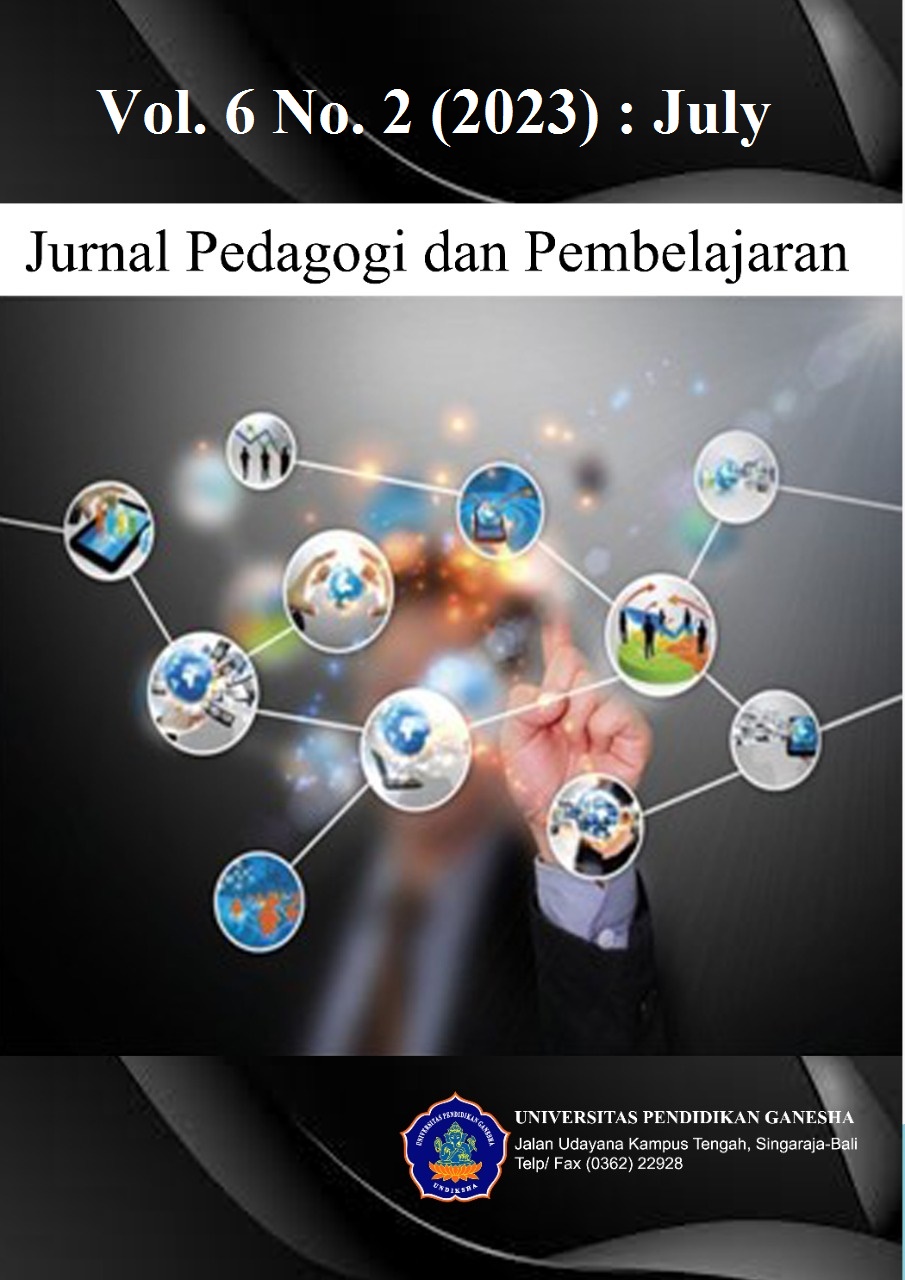The Impact of "Spiritual Tour" Based Panel Discussion Learning on Spiritual Intelligence and Emotional Intelligence
DOI:
https://doi.org/10.23887/jp2.v6i2.59453Keywords:
Spiritual Intelligence, Emotional Intelligence, Panel Discussion, Spiritual TourAbstract
Many students have high intellectual intelligence, but only a few have good spiritual and emotional intelligence. This is because the learning process that is carried out only focuses on applying conventional learning models. This study aims to determine the effect of panel discussions based on "spiritual tours" on spiritual and emotional intelligence. This research belongs to the type of quasi-experimental research design in the form of a posttest-only control design. The population in the study amounted to 105 students. Samples were taken by random sampling technique, amounting to 66 students. The data collection method used is standardized tests, both spiritual and emotional intelligence tests. The analysis technique uses MANOVA with the help of SPSS. The results showed that the analysis of the Pilae Trace, Wilks' Lambda Hotelling's Trace, and Roy's Largest Root showed that the F coefficient was 9535.67b with a value of Sig. 0.00. Analysis of Tests of Between-Subjects Effects shows an F value of 5.79 with Sig. 0.02, smaller than 0.05, indicates an effect of learning with a spiritual tour-based panel discussion learning model on spiritual intelligence. Moreover, the Tests of Between-Subjects Effects analysis results show an F value of 2.53 with Sig. 0.02, which is smaller than 0.05. It shows a big influence between learning with the spiritual tour-based panel discussion learning model on emotional intelligence. Based on these results, the panel discussion learning model based on spiritual tours simultaneously or partially impacts spiritual and emotional intelligence.
References
Ahmad, A. A., & Ambotang, A. S. Bin. (2020). Pengaruh Kecerdasan Emosi, Kecerdasan Spiritual dan Persekitaran Keluarga Terhadap Stres Akademik Murid Sekolah Menengah. Malaysian Journal of Social Sciences and Humanities (MJSSH), 5(5), 12–23. https://doi.org/10.47405/mjssh.v5i5.407. DOI: https://doi.org/10.47405/mjssh.v5i5.407
Akpur, U. (2020). Critical, Reflective, Creative Thinking and Their Reflections on Academic Achievement. Thinking Skills and Creativity, 37(8), 100683. https://doi.org/10.1016/j.tsc.2020.100683. DOI: https://doi.org/10.1016/j.tsc.2020.100683
Anggreni, D. P. D., & Rudiarta, I. W. (2022). Pengaruh Teman Sebaya Terhadap Motivasi Belajar Agama Hindu Perspektif Teori Belajar Sosial. Padma Sari: Jurnal Ilmu Pendidikan, 1(02), 142–151. https://doi.org/10.53977/ps.v1i02.353. DOI: https://doi.org/10.53977/ps.v1i02.353
Blayone, T. J. B., Oostveen, R. Van, Barber, W., Giuseppe, M. Di, & Childs, E. (2017). Democratizing Digital Learning: Theorizing The Fully Online Learning Community Model. International Journal of Educational Technology in Higher Education, 14(1), 1–16. https://doi.org/10.1186/s41239-017-0051-4. DOI: https://doi.org/10.1186/s41239-017-0051-4
Bustami, Y., Corebima, A. D., Suarsini, E., & Ibrohim. (2017). The social attitude empowerment of biology students: Implementation JiRQA learning strategy in different ethnics. International Journal of Instruction, 10(3), 15–30. https://doi.org/10.12973/iji.2017.1032a. DOI: https://doi.org/10.12973/iji.2017.1032a
Chittum, J. R., Jones, B. D., Akalin, S., & Schram, A. B. (2017). The Effects of an Afterschool STEM Program on Students' Motivation and Engagement. International Journal of STEM Education, 4(1), 1–16. https://doi.org/10.1186/s40594-017-0065-4. DOI: https://doi.org/10.1186/s40594-017-0065-4
Collier, B., & Stewart, J. (2021). Privacy Worlds: Exploring Values and Design in The Development of the Tor Anonymity Network. Science Technology and Human Values, 20(10), 1–27. https://doi.org/10.1177/01622439211039019. DOI: https://doi.org/10.1177/01622439211039019
Cooper, K. M., Downing, V. R., & Brownell, S. E. (2018). The Influence of Active Learning Practices on Student Anxiety in Large-Enrollment College Science Classrooms. International Journal of STEM Education, 5(1), 1–18. https://doi.org/10.1186/s40594-018-0123-6. DOI: https://doi.org/10.1186/s40594-018-0123-6
Dare, E. A., Ellis, J. A., & Roehrig, G. H. (2018). Understanding Science Teachers Implementations of Integrated STEM Curricular Units Through a Phenomenological Multiple Case Study. International Journal of STEM Education, 5(1), 1–19. https://doi.org/10.1186/s40594-018-0101-z. DOI: https://doi.org/10.1186/s40594-018-0101-z
Darma, M. (2020). Pengaruh Diskusi Panel Dalam Pembelajaran Fiqh Kelas VII Terhadap Intensitas Perhatian Siswa Madrasah Tsanawiyah Aziddin Kecamatan Medan Denai. J-Paris: Jurnal Pendidikan Agama Islam Dan Riset, 1(2). https://jurnal.uisu.ac.id/index.php/jparis/article/view/4253%0A.
Devi, G. A. D. S., Ayuningtias, A. U. H., & Hartika, L. D. (2019). Hubungan Spiritual Tourism dan Coping dengan Kebahagiaan pada Perkumpulan International Society for Krishna Consciousness (ISKCON) di Bali. Jurnal Psikologi Mandala, 3(2). https://doi.org/10.36002/jpm.v3i2.1092.
Erlia, A. W. (2023). Metode Pembelajaran Hindu Melalui Ajaran Sad Dharma. Lampuhyang, 14(2), 25–35. https://doi.org/10.47730/jurnallampuhyang.v14i2.349. DOI: https://doi.org/10.47730/jurnallampuhyang.v14i2.349
Estapa, A. T., & Tank, K. M. (2017). Supporting Integrated STEM in The Elementary Classroom: A Professional Development Approach Centered on an Engineering Design Challenge. International Journal of STEM Education, 4(1), 1–16. https://doi.org/10.1186/s40594-017-0058-3. DOI: https://doi.org/10.1186/s40594-017-0058-3
Eze, S. C., Eze, V. C. C., & Bello, A. O. (2018). The Utilisation of E-Learning Facilities In The Educational Delivery System of Nigeria: A Study of M-University. International Journal of Educational Technology in Higher Education, 15(1), 1–20. https://doi.org/10.1186/s41239-018-0116-z. DOI: https://doi.org/10.1186/s41239-018-0116-z
Fidalgo, P., Thormann, J., Kulyk, O., & Lencastre, J. A. (2020). Students Perceptions on Distance Education: A Multinational Study. International Journal of Educational Technology in Higher Education, 17(1), 1–18. https://doi.org/10.1186/s41239-020-00194-2. DOI: https://doi.org/10.1186/s41239-020-00194-2
Giri, I. M. A., & Perbowosari, H. (2020). Peningkatan Mutu Kecerdasan Spiritual Dan Emosional Siswa Sekolah Dasar Melalui Pengembangan Model Siklus Belajar Catur Pramana. Jurnal Penjaminan Mutu, 6(2). https://doi.org/10.25078/jpm.v6i2.633.
Greenland, S., Saleem, M., Misra, R., & Mason, J. (2022). Sustainable Management Education and an Empirical Five-Pillar Model of Sustainability. International Journal of Management Education, 20(3), 1–18. https://doi.org/10.1016/j.ijme.2022.100658. DOI: https://doi.org/10.1016/j.ijme.2022.100658
Groenewoudt, A. C., Rooks, G., & van Gool, P. J. R. (2019). When Problems Lead to Ideas: The Roles of Daily Vigor and Social Interactions. Journal of Creative Behavior, 53(3), 286–297. https://doi.org/10.1002/jocb.179. DOI: https://doi.org/10.1002/jocb.179
Gunada, I. W. A. (2020). Ajaran Agama Hindu Dalam Geguritan Candrabherawa Sebagai Penguatan Pendidikan Karakter. Kamaya: Jurnal Ilmu Agama, 3(2), 102–119. https://doi.org/10.37329/kamaya.v3i2.434. DOI: https://doi.org/10.37329/kamaya.v3i2.434
Hadiantoro, S. (2019). Membandingkan Keefektifan Model Pembelajaran Tipe Jigsaw dan Tipe Diskusi Panel untuk Meningkatkan Hasil Belajar Mahasiswa dalam Mempelajari Kimia Organik. Belantika Pendidikan, 2(2), 78–86. https://doi.org/10.47213/bp.v2i2.34. DOI: https://doi.org/10.47213/bp.v2i2.34
Hayati, N. M., & Setiyawati, D. (2020). Metode Diskusi Panel untuk meningkatkan keterampilan berkomunikasi di Madrasah Ibtidaiyah. Ghaitsa: Islamic Education Journal, 1(3), 159–169. https://siducat.org/index.php/ghaitsa.
Herliana, S., & Anugraheni, I. (2020). Pengembangan Media Pembelajaran Kereta Membaca Berbasis Kontekstual Learning Siswa Sekolah Dasar. Jurnal Basicedu, 4(2), 314–326. https://doi.org/10.31004/basicedu.v4i2.346. DOI: https://doi.org/10.31004/basicedu.v4i2.346
Herlina, H. (2020). Meningkatan Hasil Belajar Siswa Melalui Penerapan Metode Diskusi Panel Pada Pembelajaran Tema 1. Diriku Di Kelas II SD Negeri 101881 Pasar VIII Kecamatan Tanjung Morawa Kabupaten Deli Serdang. Journal Of Education And Teaching Learning (JETL), 2(1), 18–27. https://doi.org/10.51178/jetl.v2i1.52. DOI: https://doi.org/10.51178/jetl.v2i1.52
Jaelani, A. Q., & Ilham, L. (2019). Strategi Meningkatkan Kecerdasan Emosional dan Spiritual Siswa. Komunika: Jurnal Dakwah Dan Komunikasi, 13(1), 97–106. https://doi.org/10.24090/komunika.v13i1.2056. DOI: https://doi.org/10.24090/komunika.v13i1.2056
Kintu, M. J., Zhu, C., & Kagambe, E. (2017). Blended Learning Effectiveness: The Relationship Between Student Characteristics, Design Features and Outcomes. International Journal of Educational Technology in Higher Education, 14(1), 1–20. https://doi.org/10.1186/s41239-017-0043-4. DOI: https://doi.org/10.1186/s41239-017-0043-4
Martini, K. T. (2019). Strategi Pembelajaran Guru Agama Hindu Relevansinya Dalam Pengembangan Kecerdasan Emosional Siswa Kelas X Ipa 1 Sma Negeri 1 Sukasada. Maha Widya Bhuwana, 2(1), 69–78. https://jurnal.stahnmpukuturan.ac.id/index.php/ bhuwana/article/download/170/163.
Mahendriani, N. M. A., Sumertha, I. W., & Purwanto, S. E. (2022). Strategi Guru Taman Kanak-Kanak Bernuansa Hindu Dalam Mengembangkan Nilai Pendidikan Karakter. Kumarottama: Jurnal Pendidikan Anak Usia Dini, 2(1), 38–48. https://doi.org/10.53977/kumarottama.v2i1.406. DOI: https://doi.org/10.53977/kumarottama.v2i1.406
Marianne, B. D., Hemphill, A. A., Loures-Elias, A. P. S., Garcia, L., Cooper, D., & Coombes, E. (2022). Power in a Pandemic: Teachers Unions and Their Responses to School Reopening. AERA Open, 8(1), 1–16. https://doi.org/10.1177/23328584221074337. DOI: https://doi.org/10.1177/23328584221074337
Mercader, C., & Gairin, J. (2020). University Teachers Perception of Barriers to The Use of Digital Technologies: The Importance of The Academic Discipline. International Journal of Educational Technology in Higher Education, 17(1), 1–14. https://doi.org/10.1186/s41239-020-0182-x. DOI: https://doi.org/10.1186/s41239-020-0182-x
Merta, I. P. (2022). Pengaruh Pendidikan Agama Hindu Terhadap Kecerdasan Emosional (EQ) Siswa. JAPAM (Jurnal Pendidikan Agama), 2(02), 160–170. https://doi.org/10.25078/japam.v2i02.706. DOI: https://doi.org/10.25078/japam.v2i02.706
Mingriyani, H. (2020). Peningkatan Kinerja Guru dalam Pelaksanaan Pembelajaran yang Efektif Melalui Supervisi Observasi Diskusi Panel di SDN 4 Padang Laweh Kecamatan Koto VII Tahun 2019/2020. Jurnal Penelitian Dan Budaya, 11(4). https://doi.org/10.0503/wp.v4i11.64.
Muliadiasa, K., & Aprinica, P. I. (2022). Penerapan Habitus Pada Potensi Dan Model Pengembangan Wisata Spiritual Alas Metapa Desa Peninjoan, Kecamatan Tembuku, Kabupaten Bangli. Siwayang Journal: Publikasi Ilmiah Bidang Pariwisata, Kebudayaan, Dan Antropologi, 1(2), 93–106. https://doi.org/10.54443/siwayang.v1i2.191. DOI: https://doi.org/10.54443/siwayang.v1i2.191
Permadi, K. S., Dewi, P. Y. A., Sastrawan, K. B., & Primayana, K. H. (2020). Pengembangan Kecerdasan Spiritual Anak Sekolah Dasar. Edukasi: Jurnal Pendidikan Dasar, 1(2), 179. https://doi.org/10.55115/edukasi.v1i2.923. DOI: https://doi.org/10.55115/edukasi.v1i2.923
Prasetiya, B., Safitri, M. M., & Yulianti, A. (2020). Perilaku Religiusitas: Analisis Terhadap Konstribusi Kecerdasan Emosional Dan Spiritual. Al-Tadzkiyyah: Jurnal Pendidikan Islam, 10(2), 303–312. https://doi.org/10.24042/atjpi.v10i2.5015. DOI: https://doi.org/10.24042/atjpi.v10i2.5015
Pratiwi, N. K. S. (2022). Metode Pembelajaran Dasa Dharma Sebagai Implementasi Pendidikan Holistik. Metta : Jurnal Ilmu Multidisiplin, 2(3), 133–145. https://doi.org/10.37329/metta.v2i3.1799. DOI: https://doi.org/10.37329/metta.v2i3.1799
Puspitasari, N. W. R. N. (2017). Power and religion: Geertz position of present-day Bali. Jurnal Kajian Bali (Journal of Bali Studies), 7(1), 249–258. https://doi.org/10.24843/JKB.2017.v07.i01.p13. DOI: https://doi.org/10.24843/JKB.2017.v07.i01.p13
Qoni’ah, S. (2019). Pengembangan Kecerdasan Spiritual Pada Peserta Didik Melalui Aktivitas Keagamaan. Ahsana Media, 5(1), 60–72. https://doi.org/10.31102/ahsana..5.1.2019.60-72. DOI: https://doi.org/10.31102/ahsana..5.1.2019.60-72
Redifer, J. L., Bae, C. L., & Zhao, Q. (2021). Self-efficacy and performance feedback : Impacts on cognitive load during creative thinking. Learning and Instruction, 71(1), 101395. https://doi.org/10.1016/j.learninstruc.2020.101395. DOI: https://doi.org/10.1016/j.learninstruc.2020.101395
Roberts, T., Jackson, C., Schroeder, M. J. M., Bush, S. B., Maiorca, C., Cavalcanti, M., Schroeder, D. C., Delaney, A., Putnam, L., & Cremeans, C. (2018). Students Perceptions of STEM Learning After Participating in a Summer Informal Learning Experience. International Journal of STEM Education, 5(1), 1–14. https://doi.org/10.1186/s40594-018-0133-4. DOI: https://doi.org/10.1186/s40594-018-0133-4
Ruz, P. V., & Schunn, C. D. (2018). The Nature of Science Identity and Its Role as The Driver of Student Choices. International Journal of STEM Education, 5(1), 1–12. https://doi.org/10.1186/s40594-018-0140-5. DOI: https://doi.org/10.1186/s40594-018-0140-5
Sangku, K. W., Suweta, I. M., & Wastawa, I. W. (2023). Implementasi Emotional Spiritual Quotient Sekolah Polisi Negara Polda Bali. Jurnal Pendidikan Agama Hindu Mahasiswa Pascasarjana, 2(1), 14–23. https://jurnal.stahnmpukuturan.ac.id/index.php/jurdiksca/ article/view/2953.
Shernoff, D. J., Sinha, S., Bressler, D. M., & Ginsburg, L. (2017). Assessing Teacher Education and Professional Development Needs for The Implementation of Integrated Approaches to STEM Education. International Journal of STEM Education, 4(1), 1–16. https://doi.org/10.1186/s40594-017-0068-1. DOI: https://doi.org/10.1186/s40594-017-0068-1
Sipayung, E., & Widowati, A. (2022). Pengaruh Penerapan Pendidikan Karakter Model Chips Di SD Xaverius 1 Untuk Mengembangkan Kecerdasan Spiritual Siswa Dari Perspektif Orang Tua. Jurnal Pendidikan Tematik Dikdas, 7(2), 149–155. https://doi.org/10.22437/jptd.v7i2.17987. DOI: https://doi.org/10.22437/jptd.v7i2.17987
Subawa, P. (2020). Konsep Pendidikan Dalam Ajaran Agama Hindu Di Era Digital. Jurnal Pendidikan Agama Dan Budaya, 4(1). https://doi.org/10.55115/widyacarya.v4i1.549.
Suryawan, I. A. J. (2021). Peran Pendidikan Agama Hindu Dalam Pengembangan Sumber Daya Manusia Yang Berkualitas. Jurnal Agama Dan Budaya, 5(1). https://doi.org/10.55115/purwadita.v5i1.1424.
Tegeh, I. M., Simamora, A. H., & Dwipayana, K. (2019). Pengembangan Media Video Pembelajaran Dengan Model Pengembangan 4D Pada Mata Pelajaran Agama Hindu. Mimbar Ilmu, 24(2), 158. https://doi.org/10.23887/mi.v24i2.21262. DOI: https://doi.org/10.23887/mi.v24i2.21262
Tomas, L., Evans, N. (Snowy), Doyle, T., & Skamp, K. (2019). Are First-Year Students Ready for a Flipped Classroom? A Case for a Flipped Learning Continuum. International Journal of Educational Technology in Higher Education, 16(1), 1–22. https://doi.org/10.1186/s41239-019-0135-4. DOI: https://doi.org/10.1186/s41239-019-0135-4
Wira, I. A. D. (2020). Kegiatan Dharma Yatra Pada Masyarakat Desa Lokapaksa Ke Pura Batur. Religious Education And Hindu Culture, 11(2). https://doi.org/10.33363/ba.v11i2.527.
Wisudayanti, K. A. (2020). Pengembangan Kecerdasan Emosional Siswa di Sekolah Dasar Melalui Penanaman Pendidikan Karakter. Jurnal Pendidikan Dasar, 1(2). https://doi.org/10.55115/edukasi.v1i2.918.
Zhou, L., & Li, J. (2021). Developing Core Competence With Project-Based Learning: Voices From Chinese High School Students Serving Visually Impaired Students. ECNU Review of Education, 1–7. https://doi.org/10.1177/20965311211005478. DOI: https://doi.org/10.1177/20965311211005478
Downloads
Published
How to Cite
Issue
Section
License
Copyright (c) 2023 I Wayan Suwendra, I Wayan Widiana

This work is licensed under a Creative Commons Attribution-ShareAlike 4.0 International License.
Authors who publish with Jurnal Pedagogi dan Pembelajaran agree to the following terms:- Authors retain copyright and grant the journal the right of first publication with the work simultaneously licensed under a Creative Commons Attribution License (CC BY-SA 4.0) that allows others to share the work with an acknowledgment of the work's authorship and initial publication in this journal
- Authors are able to enter into separate, additional contractual arrangements for the non-exclusive distribution of the journal's published version of the work (e.g., post it to an institutional repository or publish it in a book), with an acknowledgment of its initial publication in this journal.
- Authors are permitted and encouraged to post their work online (e.g., in institutional repositories or on their website) prior to and during the submission process, as it can lead to productive exchanges, as well as earlier and greater citation of published work. (See The Effect of Open Access)













